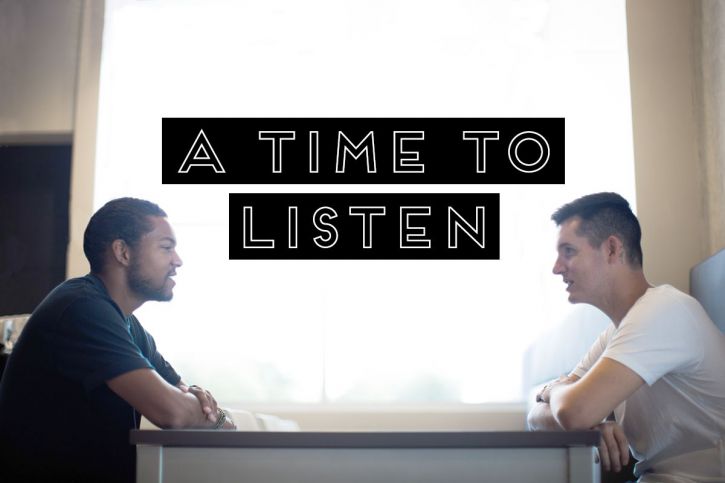A Time to Listen
In today’s world it seems everyone is quick to share an opinion. With the current turmoil over race relations, should we be doing more sharing or more listening?

There are virtually no voices trying to justify or minimize the brutality of George Floyd’s murder. There are many voices supporting peaceful demonstrations while decrying the rioting and senseless violence (which so often erupts amid attempts at constructive protest).
There are voices calling for an end to racism, for peace, for greater accountability and better training of police, and for criminal justice reform. And sadly, there are even voices hurling blame at one group or another, voices fanning the flames of anger and voices screaming at anyone who disagrees.
If there is anything America never seems to lack, it’s voices.
Social media has given massive platforms to anyone with an opinion, regardless of its validity or how it’s expressed. If you can think it, write it or say it, you will have no limitation on sharing it with the entire Internet universe.
To be fair, this blog is not that different, so why should you pay any attention to it?
For one reason, because I’m not seeking to tell you what you should think. I’m just asking a question.
But to understand the question, we need a little background from a source most people aren’t considering right now. It is the biblical book of Job, one of the oldest stories in written literature. The book tells Job’s story and offers many thought-provoking lessons.
The tragic experience of Job
As the story unfolds, Job, a very prosperous man, suffers a series of sudden and tragic personal catastrophes. In one day he loses all his children and possessions, and is left with virtually nothing. As if that weren’t enough, in short order he is stricken with a painful and debilitating skin disease that leaves him sitting in a pile of soft ashes for relief.
His wife, who has obviously lost everything too (except her health), is so distraught at her husband’s suffering that she tells him he would be better off dead.
But most important of all in Job’s story is that he was described as a righteous man whose life pleased God (Job 1:8). Not only were all of his physical blessings stripped from him, but he also felt like he had lost the most important relationship in his life. How could God allow this to happen after Job had worked so hard to live his life the right way? (Job asked questions of God, but never cursed or rejected Him, Job 2:9-10.)
At this point, Job is visited by three of his friends. We should probably put quotation marks around “friends”—but that’s getting ahead of the story.
"...let every man be swift to hear, slow to speak, slow to wrath..."
- James 1:19
Job’s friends are so shocked by his appearance that they are speechless for a while. But after hearing Job’s lamentation about his condition (Job 3), they each shared with him their opinion and advice. They were convinced that God would not allow this to happen to Job unless he was guilty of some major hidden sin. They accused him of everything they could imagine, and each time Job showed he was innocent.
But the “facts” didn’t shut them up. They were so convinced that they were correct, so totally convinced of the rightness of their own arguments, that they just kept bludgeoning the suffering man with useless advice.
Finally, in frustration, Job said to them: “Miserable comforters are you all!” (Job 16:2).
They were all so eager to share their opinion that no one seemed to listen to Job, or to really seek God’s perspective.
Could we be guilty of the same thing?
Do we listen?
I’m a white man. My parents tried to teach me that racial prejudice was wrong. But my parents were products of the 1930s and ’40s, and their ideas of racial equality were far from what we would accept today.
How much do I really understand about the experience of men and women of color in today’s America? Am I quick to give my voice—my opinion, my perspective—without first listening?
Let me repeat that—really listening. Listening to understand.
When I was in my late 20s, I had a black friend who was a few years older than me. One day as we were talking, he began to share some of his experiences as a young black man growing up in the 1950s on the border of Arkansas and Mississippi. I had no idea such things happened in this country. After all, they didn’t happen in “my world,” where all policemen were my friends, neighborhoods were safe, and life was generally lived without much fear.
Through the years, other men and women have shared their stories with me, not out of anger, but to help me understand. I will be forever grateful to all of them for trusting me with their experiences and helping to open my eyes.
I now find myself a little slower to offer good-sounding platitudes until I take the time to listen and try to understand first.
Have you ever sat with someone who feels abused, marginalized, frustrated, angry, hopeless and just listened to understand? Really listened, without (or at least before) offering your perspective, solutions or experiences? For that matter, how many of us have spent time with a police officer and asked him or her what it is like to be a first responder on the front lines every day?
Instead of being “miserable comforters,” like’s Job’s so-called friends, maybe it’s time to do a little more listening and a little less sharing of our “humble” opinions.
We just might learn something.
Date Posted: June 5, 2020

